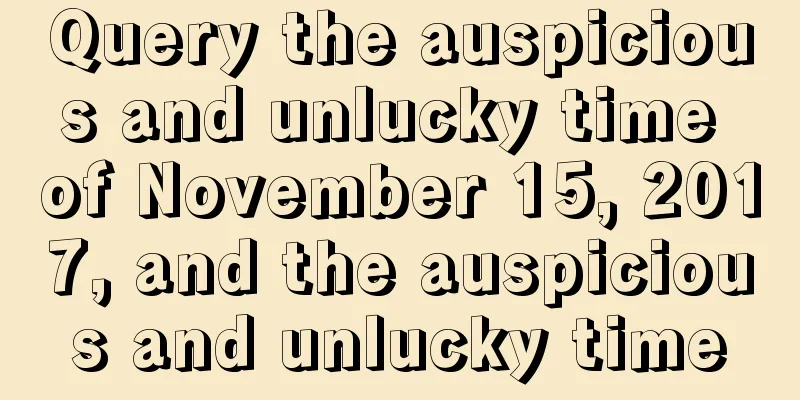What are the customs and habits of Qingming Festival?

my country's traditional festivals have one thing in common: the longer the festival has been passed down, the more customs it has. The Qingming Festival has a history of more than 2,500 years since the Zhou Dynasty, so naturally there are many customs and habits. Winter has gone and spring has come. February in the lunar calendar has already entered spring. The Fortune Teller website provides you with more detailed information about February in the lunar calendar of 2018! In addition to banning fire and sweeping tombs, the customs of Qingming Festival also include a series of folk sports activities such as outing, swinging, kicking football, playing polo, and planting willows. According to legend, this is because no fire is allowed during the Cold Food Festival. In order to prevent the cold food from harming the body, people participate in some sports activities to exercise. During the Qingming Festival, people avoid using needles and washing clothes, and women in most areas avoid walking. Before dusk, a line of ash should be sprinkled in front of the front door, which is said to prevent ghosts from entering the house. Therefore, this festival is full of unique features, with both the sad tears of visiting new graves and the laughter of outings.SwingThis is the custom of Qingming Festival in ancient China. Wang Renyu of the Five Dynasties wrote in "The Remaining Stories of Kaiyuan and Tianbao" that "During the Cold Food Festival, a swing was erected in the Tianbao Palace for the concubines to play and have fun. The emperor called it the play of the half-immortals, and the people in the capital called it that as well." Wen Yanbo, the prime minister of the Song Dynasty, wrote in his poem "Passing by Dragon Gate on the Cold Food Day" that "beside the bridge, willow trees hang down green threads, and there are many swings with colorful ropes." A swing means moving by pulling on a leather rope.It has a very ancient history. It was originally called Qianqiu, but later it was changed to swing to avoid taboos. In ancient times, swings were mostly made of tree branches as frames, tied with colorful ribbons. Later it gradually developed into a swing with two ropes and pedals. Swinging can not only improve health, but also cultivate courage. It is still loved by people, especially children. CujuJu is a leather ball made of leather and stuffed with hair inside. Cuju is kicking the ball with the feet. This was a favorite game during the Qingming Festival in ancient times. According to legend, it was invented by Huangdi and its original purpose was to train warriors. Playing polo is also one of the activities during the Dragon Boat Festival. Polo is a game in which one hits a ball with a stick while riding on a horse. It was called Jiju in ancient times. In the Three Kingdoms' poem "Famous Capitals" by Cao Zhi, there is a line "Continuously hitting the ground with balls". "Xijing Zhi" records that the Liao Dynasty regarded playing polo as a traditional festival custom, and played polo on the Dragon Boat Festival and Double Ninth Festival. "History of Jin Dynasty: Rituals" also records that the Jin people played ball during the Dragon Boat Festival. There was a "ball-playing music" dance troupe in the Song Dynasty. Polo was still popular in the Ming Dynasty.The "Continued Comprehensive Examination of Literature and Art·Examination of Music" records that Emperor Chengzu of the Ming Dynasty went to the East Garden several times to play ball and shoot willows. The long scroll "Emperor Xuanzong Enjoying Pleasure" in the Ming Dynasty depicts the scene of Emperor Xuanzong enjoying polo. Wang Zhi, an official at that time, wrote a poem about watching people playing ball on the Dragon Boat Festival: "A jade-bridled horse worth a thousand gold, and a ball carved with seven treasures. The horse flies like lightning, and I lie down and feel the stars flowing. Three victories are achieved in the scorching sun, and I am happy to win the first prize. Celebratory clouds follow the horse's feet, and linger around the east end of the hall." There is also a tradition of people playing ball on horseback in front of the Baiyun Temple in Beijing. Polo was still played in the Temple of Heaven area during the Qing Dynasty, but it disappeared after the middle of the Qing Dynasty. Starting in 1965, antique polo appeared in Xi'an, making this ancient sport reappear in China after being extinct for many years. OutingAlso called spring outing. In ancient times, it was called Tanchun, Xunchun, etc. During the Qingming Festival in April, spring returns to the earth and nature is full of vitality. It is a great time for an outing. The Chinese people have long maintained the custom of outing during the Qingming Festival.Planting treesAround the Qingming Festival, the spring sun shines and the spring rain falls, so the survival rate of planted seedlings is high and they grow fast. Therefore, China has had the custom of planting trees on Qingming Festival since ancient times. Some people also call Qingming Festival "Arbor Day". The custom of planting trees has been passed down to this day.The custom of planting trees on Qingming Festival originated from the custom of wearing willows and planting willows on Qingming Festival. There are three legends about wearing willows and planting willows on Qingming Festival. The oldest legend says that it was to commemorate Shennong, the ancestor who taught people how to farm, and later it developed into a meaning of praying for longevity. A later legend is related to Jie Zitui. It is said that when Duke Wen of Jin led his ministers to the mountain to pay tribute to Jie Zitui, they discovered that the old willow tree that Jie Zitui had leaned on before his death had come back to life, so they named the old willow tree "Qingming Willow". A later legend has it that Emperor Taizong of Tang gave willow wreaths to his ministers as a sign of blessing and to ward off epidemics. Flying a kiteFlying kites is also a favorite activity among people during the Qingming Festival. During the Qingming Festival, people set off fireworks not only during the day but also at night. At night, strings of colorful lanterns are hung under the kite or on the wind-stable pull line. They look like twinkling stars and are called "magic lanterns." In the past, some people would cut the strings after releasing the kites into the blue sky and let the breeze carry them to the ends of the earth. It was said that this would ward off disease and disaster and bring good luck.Tomb sweepingTomb sweeping during Qingming Festival is called "respect for ancestors". The custom has a long history. The Ming Dynasty's "A Brief Account of Scenery in the Imperial Capital" records: "On the Qingming Festival in March, men and women sweep the tombs, carrying jugs, with paper mulberry sticks hung behind sedan chairs and horses, filling the streets with people. Those who worship, pour wine, cry, and weed and add soil to the tombs burn paper mulberry sticks and place paper money on the grave. If there is no paper money in sight, then the grave is an isolated one. After crying, people do not return home, but instead go to fragrant trees and choose gardens, where they sit and get drunk." In fact, tomb sweeping existed before the Qin Dynasty, but it was not necessarily during the Qingming Festival. Tomb sweeping on the Qingming Festival is a practice that began after the Qin Dynasty. It only became popular during the Tang Dynasty. And it has been passed down to this day.The Qingming Festival memorial ceremony should be held in person at the cemetery, but since each family’s economic and other conditions are different, the ways of memorializing the dead are also different. "Burning bundles" is the main form of ancestor worship. The so-called "package", also known as "parcel", refers to the parcel sent from the world of the living to the "underworld" by filial relatives. In the past, paper shops in the south sold so-called "bag skins", which were large bags made of white paper. There are two forms: one is to use a woodcut version, with the Sanskrit transliteration of "Nirvana Sutra" printed around it, and a lotus seat tablet printed in the middle, on which the name of the deceased is written, such as: "The late Mr. Zhang Fujun, whose name is Yunshan". It is both a postal package and a tablet. The other type is a plain wrapping cloth without any pattern printed on it. There is only a blue label in the middle with the name of the deceased written on it. Also used as the main card. There are many kinds of paper money in the bundle. [1] Planting willowsDuring the Qingming Festival, Chinese people have the custom of planting willows. Experts say that there are three common theories about the origin of the custom of planting willows during Qingming Festival.According to Zhao Zhiheng, director of the Tianjin Astronomical Society, the custom of planting willows is to Qingming and WillowTo commemorate Shennong, the ancestor of agriculture who "taught people how to farm." In some places, people insert willow branches under the eaves to predict the weather. There is an old saying that goes "When the willow branches are green, it will rain; when the willow branches are dry, the sky will be sunny." Willows have strong vitality. As the saying goes, "If you plant flowers with care, they may not grow; but if you plant willows by accident, they may grow into shade trees." Willow branches will grow wherever they are planted. If you plant willows every year, shade trees will grow everywhere.There is another saying about planting willows and wearing willows on Qingming Festival: Chinese people regard Qingming Festival, the 15th day of the seventh lunar month and the first day of the tenth lunar month as the three major ghost festivals. The Qingming Festival is the time when ghosts appear frequently and demand many things. Influenced by Buddhism, Guanyin holds a willow branch and dips it in water to save all living beings. Many people believe that willow branches have the effect of exorcising ghosts and evil spirits, and call willow branches "ghost-fearing wood." In the "Qimin Yaoshu" by Jia Sixie of the Northern Wei Dynasty, it is written: "Put willow branches on the door, and all ghosts will not enter the house." Since Qingming is the Ghost Festival, when willow branches sprout, people would plant willow branches and wear willow branches to ward off evil spirits. Another theory is that this custom is to commemorate Jie Zitui. Jie Zitui burned himself under a big willow tree to show his loyalty and chastity, which made Duke Wen of Jin and his ministers and people very sad. The next year, when Duke Wen of Jin led his ministers to climb the mountain to pay tribute to Jie Zitui, they discovered that the old willow tree that had been burned that year had come back to life. Duke Wen of Jin immediately named the old willow tree "Qingming Willow" and broke off a few willow branches on the spot and wore them on his head to express his remembrance. From then on, officials and common people followed suit and it became a trend. Planting willow branches and wearing willow branches during the Qingming Festival became a symbol of commemorating Jie Zitui.[17] Shooting the WillowShooting willow is a game for practicing archery skills. According to records from the Ming Dynasty, they would put a pigeon in a gourd, then hang the gourd high up on a willow tree, shoot the gourd with a bow, and the pigeon would fly out, and the winner would be determined by how high the pigeon flew. [1]cockfightingIn ancient times, cockfighting was popular during the Qingming Festival. It started from the Qingming Festival and lasted until the summer solstice. The earliest record of cockfighting in China can be found in Zuo Zhuan. In the Tang Dynasty, cockfighting became popular. Not only ordinary people fought cockfights, but even the emperor participated in cockfighting. For example, Emperor Xuanzong of Tang loved cockfighting the most. [1]Silkworm Flower Festival"Silkworm Flower Festival" is a unique folk culture in the silkworm hometown. In the past, during the Qingming Festival, this folk activity was held in Wutong, Wuzhen, Chongfu, Zhouquan and other places. Among them, the silkworm flower fairs at Ma Ming Temple in Zhouquan and Shuang Miaozhu in Qingshi are the most splendid and grand. Ma Ming Temple is located in the west of Zhouquan Town and is known as the "King of Temples" locally. Every year, the Silkworm Festival is crowded with people and there are frequent activities, including welcoming the Silkworm God, rowing speedboats, making noise on the stage, worshiping on incense stools, boxing, dragon lanterns, high poles, singing operas and more than ten other activities. Some of these activities are carried out on shore, but most of them are carried out on boats, which is very characteristic of the water town. |
<<: Is it possible to get engaged or married on February 19th of the lunar calendar in 2018?
>>: How should a child born on Qingming Festival in 2018 whose five elements lack water be named?
Recommend
Is the 17th day of the twelfth lunar month in 2018 a suitable date for burning incense and praying?
Introduction: In our country’s traditional culture...
The most auspicious office Feng Shui tips for New Year's Day 2017
Introduction: We often say that time flies like a...
Where is the best place to travel in the seventh month of the lunar calendar? Lunar July Travel Guide
Different places are suitable for traveling at dif...
What is the "Stealing Vegetables Festival" during the Lantern Festival that you don't know about?
Introduction: The Lantern Festival is a traditiona...
Is June 26, 2021 a good day to pray? Is this a good day?
No matter who you are, you all hope that what you ...
Personality and destiny of boys born on the 15th day of the sixth lunar month in the year of Renyin 2022
The personality and destiny of a boy born on June ...
What characters are suitable for naming babies born on Chinese Valentine's Day in 2018?
The choice of words in a name is a very speculativ...
Is it a good idea to open a new store on July 21st of the lunar calendar in 2022? What Feng Shui should we pay attention to?
July orchids are fragrant and are also known as th...
Can’t pray on the 17th day of the third lunar month in 2020? Which days in the third month of the lunar calendar are suitable for praying?
Speaking of the time to pray, I believe everyone h...
Can I have a caesarean section on the fourth day of the seventh lunar month in 2022? What are the lunar calendar and hexagrams like?
The seventh month of the lunar calendar marks the ...
Is September 13th of the lunar calendar in 2021 a good year? What is your zodiac sign?
September is known as late autumn, late autumn, qu...
Is the sixth day of the fifth lunar month in 2020, the day after the Dragon Boat Festival, an auspicious day for worshiping graves?
Introduction: It is necessary to choose an auspici...
Is November 14th of the lunar calendar 2019 a good day?
Is November 14th of the lunar calendar 2019 a goo...
Is the fourth day of the eleventh lunar month in 2018 suitable for opening a new store or company?
There are good and bad days, and this happens rep...
Is July 18th of the lunar calendar in 2022 an auspicious day for proposing? Is it a good day?
July is here. Is the 18th day of the seventh lunar...









